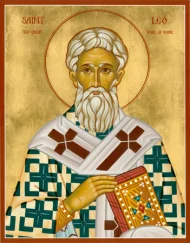 Even when your body does nothing, sin can be active in your mind.
Even when your body does nothing, sin can be active in your mind.
When your soul inwardly repulses the evil one’s attack by means of prayer, attention, remembrance of death, godly sorrow and mourning, the body, too, takes its share of holiness, having acquired freedom from evil actions.
This is what the Lord meant by saying that someone who cleans the outside of a cup has not cleansed it inside, but clean the inside, and the whole cup will be clean (Matthew 23:25-26).
“Strive as hard as you can to ensure that your inner labour is according to God’s will, and you will conquer the outward passions” (Abba Arsenios, Apophthegmata Pateron 9).
If the root is holy, so are the branches (John 15:5). If the yeast is holy, so is the dough (Galatians 5:9).
“Walk in the spirit”, says Paul, “and ye shall not fulfil the lust of the flesh” (Galatians 5:16).
Christ did not abolish the Jewish circumcision but fulfilled it. He Himself says, “I am not come to destroy the law, but to fulfil” (Matthew 5.17).
How did He do this? It was a seal, a sign and a symbolic way of teaching about cutting off evil thoughts in the heart….
The Jews…were reproached by the prophets for being uncircumcised in their hearts (cf. Jeremiah 9:26; Romans 2:25).
Man looks at the outward person, but God regards the heart, and if it is full of foul or evil thoughts, that man deserved to have God turn away from him.
That is why the apostle exhorts us to pray without wrath and doubting (1 Timothy 2:8).
To teach us to strive for the spiritual circumcision of our hearts, the Lord pronounces the pure in heart and the poor in spirit blessed.
He stresses that the reward for this purity of heart is seeing God, and He promises the kingdom of heaven to the poor (Matthew 5:8, 3). By the poor He means those who live frugally and in need.
But it is not only such people whom He calls blessed, but also those who are like them in spirit, those who, because of their inner humility of heart and their good purpose, have arranged their outward life accordingly.
He forbids not just murder but anger, and commands us to forgive from our hearts those who sin against us. Nor will He accept the gift we offer unless we are first reconciled with one another and let go of anger (Matthew 5:21-24).
Gregory Palamas (1296-1359): Homily for the Fourth Sunday in Lent, from Saint Gregory Palamas: The Homilies (Mount Thabor Publishing, 2009).
















